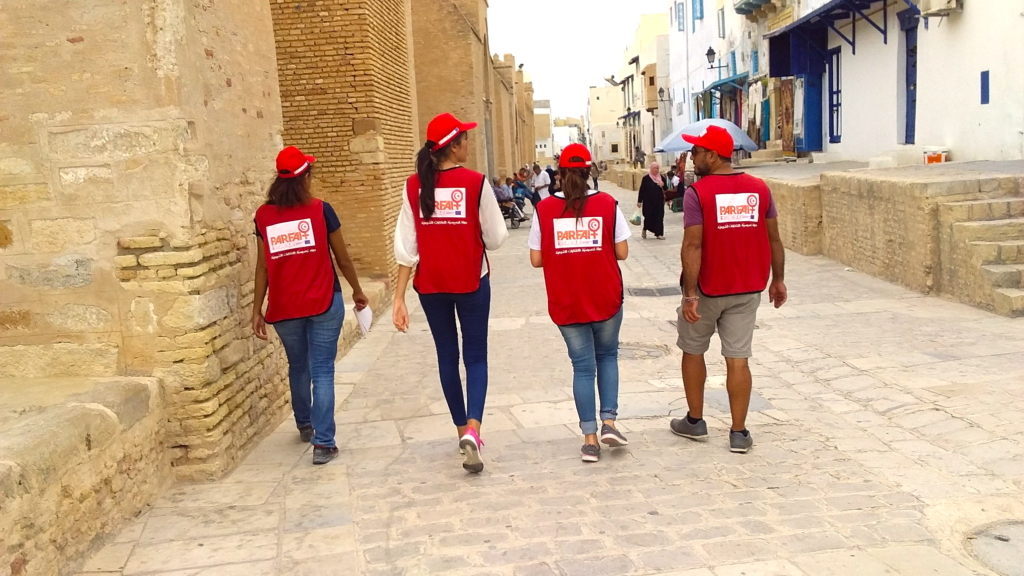
POLITICAL PARTICIPATION, DECENTRALIZATION AND GENDER MAINSTREAMING: THE PARFAIT PROJECT IN TUNISIA
There are still fewer than a hundred National Action Plans (NAPs) on Women, Peace and Security while we witness the 20th anniversary of the adoption of UN Security Council Resolution (UNSCR) 1325 (2000). In Tunisia, the default principle for the implementation of the Women, Peace and Security agenda has been “No Peace Talks for Us Without Us,” and this has been put into practice by including women in political processes through promoting political decentralization and enhancing women’s political participation in marginalized communities Tunisia has also developed and adopted its first NAP, for the period of 2018-2022.
The Tunisian NAP has been developed by women and for women as well various stakeholders involved with maintaining peace and security across the country, through a multi-stakeholder approach involving many women from civil society organizations across different regions. Working on national issues using this approach is not new in a country that has successfully progressed to a democracy since the Jasmine Revolution. One of the best practices of using this approach is encouraging the participation of women and involving them in the work of local authorities. A unique example of the best practices in this area is the PARFAIT project, whose goal was to improve women’s participation in local governance in Tunisia.
The PARFAIT project was conceived and implemented by the European Association for Local Democracy (ALDA) with the support of the European Union, as well as the help of a strong partnership between the Coalition for Women of Tunisia, the Tunisian branch of the European Partnership for Democracy (EPD) and the Agency for Local Democracy in Kairouan. The project consisted of raising awareness on the benefits of the active engagement and participation of women in local governance while training and empowering them to take a leadership role within their local communities and reach the decision-making level. The project was implemented across six governorates (Gafsa, Grand Tunis, Jendouba, Kairouan, Kebili and Mahdia) and its main activities included workshops on themes related to elections, electoral law, gender sensitivity and project cycle management, and grants to support micro-projects aimed at grassroots mobilization and engagement.
“The effective implementation of NAPs requires the full engagement of women in various sectors, yet this is often a luxury reserved to women coming from wealthy economic backgrounds.”
______
SIX BEST PRACTICES FROM WORKING AT THE GRASSROOTS LEVEL
Given the nature and success of the micro-projects supported by the PARFAIT project, their replicability and the fact that the context in which they were implemented present several similarities with other countries in the Middle East and North Africa, listing some of the best practices could be useful and further the promotion of NAPs on Women, Peace and Security.
To begin with, the effective implementation of NAPs requires the full engagement of women in various sectors, yet this is often a luxury reserved to women coming from wealthy economic backgrounds. For this reason working on economic empowerment is crucial in promoting quality education and protecting vulnerable communities in marginalized areas or conflict zones where women mostly depend on the income of their family. Once these women become independent, their self-confidence increases and they invest their time and efforts in becoming active members of civil society. The need for economic empowerment was well noticed in the planning phase of the project “Abri”, implemented by the association Femmes pour un Développement Durable de Mahdia, which included a series of workshops aimed at encouraging private initiatives for the creation of income-generating activities by women. A second series of workshops were also held with the aim of creating projects and identifying means of supporting them. Women who participated in these workshops, received maximum support entailing microcredits, strategic and technical support according to the needs of their prospective projects.
Secondly, creating a community-based dialogue between local actors, associations, the municipality, and women undoubtedly increases the cooperation of each party in the implementation of NAP-related activitiesand gender mainstreaming. During the project “Trait d’Union” , implemented by Association Inaya Sanitaire,a community listening unit was created at the municipality of Kebili with the presence of 12 to 20 women. This unit allowed women to share their needs or simply deliver messages they considered important to the municipality. This initiative supported women and the municipality with its new concept of active citizen participation and in the formation of a development plan that met the needs of citizens and local authorities in the region. Consultations and direct meetings of citizens, especially women, with other civic actors created an atmosphere of bottom-up and participatory exchange and facilitated active participation, which is the basis of transparency and accountability, two important features of the formation of any NAP.
One of the most effective solutions to overcome the challenge of inclusivity is to organize field visits to the places of residence of marginalized communities in order to initiate dialogue, understand their needs and identify the threats and opportunities they are facing and to promote the participation and protection pillars locally. Association Femmes pour le Développement et l’Égalité included this model of inclusion in its project, called “Encouragement des femmes pour participer à la vie publique et à la société civile”. During the visits, volunteers from the project noted that 80% of the public had pessimistic thoughts about elections. Yet, with this information at hand, volunteers were able to convince them of the importance of the election and voting for a decent life for them, their children and future generations.
“A total of 354 women participated in at least one of the workshops organized in the PARFAIT project. Of these women, 147 followed the majority of the cycle of workshops, and 9 were eventually elected during the municipal elections in May 2018.”
In regards to improving women’s ability to participate and engage in peacebuilding, conflict resolution processes and local politics which is a less visible yet key aspect of guaranteeing the successful implementation of a NAP, the experience of the PARFAIT project shows that it is important to obtain the support of a smaller group of women with community leadership and mediation potentials to connect citizens and local authorities. A unique example of this measure is the innovation of Association Elbasikat pour le Développement’ in creating a Social Inclusion Group of Women with their project entitled “Balidti”. Fifteen female leaders established this informal structure and took the responsibility of multiplying their learnings and sensibilizing not only women, but men and all the community members. Focused on reforestation and renovation activities, the initiative was able to triple the number of people involved, and the number of female participants radically increased in the municipalities of Bechri, Fatnnsa and Negga. Additionally, to promote the participation pillar, the members of the group were offered a mentorship opportunity during an internship at the municipality of Souk Lahad.
Gender mainstreaming is one of the most important components of any NAP and one of the most effective ways to promote it is to use the gender approach to directly mobilize young women in community service activities. As part of its micro-project, “Mahdia Parfaite”, the Tunisian Center For Social Entrepreneurship (Lingare Mahdia)engaged young women incommunity service activities such as renovating parts of their neighborhoods. Their efforts sparked curiosity and created opportunities for dialogue with the community, also providing a chance for indirectly discussing the project and UNSCR 1325. Providing women with this kind of space shows that they are willing and able to commit and work alongside men as active citizens. Additionally, it creates a feeling of social acceptance and involvement in their community.
Lastly, the impact of media in the formation and implementation of a NAP cannot go unnoticed as well as the influence it had during the Jasmine Revolution specifically. Different kinds of media can support the amplification and dissemination of the impact of women’s work, and organizations can reach a broader audience thanks to a smart use of media. Media can also support them in encouraging more women to participate in their work and eliminate gender stereotypes. Recording high quality videos and interviews aiming to raise awareness and posting them on social media, using official channels such as radio and TV channels can make a real difference, especially if the process is carried out with sensitivity to the audience’s background. As an example, Association Femme Rurale Jendouba held consultations and workshops with rural women in which discussions focused on the latter’s needs and expectations. To reach decision-makers and local authorities, the association then disseminated the results of these activities through radio Rayhana. Another smart use of media was carried out by Association Tunisienne de Protection de l’Environnement et Promotion de l’Emploi, which shared information about their project activities on various radio channels and newspapers.

______
CONCLUSION
Overall, a total of 354 women participated in at least one of the workshops organized in the PARFAIT project. Of these women, 147 followed the majority of the cycle of workshops, and 9 were eventually elected during the municipal elections in May 2018. To ensure the sustainability and progression of a NAP, however, developing the capacity of women in participating in relevant regional, national and international events becomes imperative. This results, in fact, in consolidating their negotiation potential, public speaking abilities and ultimately leads to expanding their network. Thus, to allow the improvement of decision-making and civic representations of their regions, it is highly relevant to encourage and train women to participate in meetings of the municipal council and in sessions of investment programmes or other relevant events. The association Développement et d’Encadrement des Jeunes et de l’Enfance, for example, has listed a number of meetings, conferences and events attended by its beneficiaries, who were trained as part of the project “Le Leadership Féminin et la Participation des Femmes Vivant dans le Milieu Rural à la Vie Politique et au Processus de Prise de Décision”. This scale of participation helped consolidate the practices learned by the women during training and dialogue sessions and brought with itself not only gender mainstreaming at the local, regional and international level, but also facilitated the participation of women at the decision-making level.
The aforementioned best practices are among the causes and effects that have contributed to the formation and development of Tunisia’s NAP. Through the cycle of involving women, especially from the grassroots, in decentralization and local politics, authorities and civil society organizations in other countries can facilitate women’s access to the decision-making level, democratization and peace processes while ensuring the full implementation of UNSCR 1325 and the Women, Peace and Security Agenda.
______
Shadi Rouhshahbaz is a young peacebuilder and author currently pursuing a master’s degree in Inter-Mediterranean Mediation and Immigration. Shadi is also a UNAOC Fellow, Delegate at the Youth, Peace and Security Consultation in Bangkok and a trained facilitator. She is the founder of PeaceMentors and supports various peacebuilding initiatives globally.
This article was published under the aegis of the Enhancing Women’s Participation in Peace and Security (WEPPS) project, whose goal is to strengthen the effectiveness and impact of the WPS Agenda in Italy, North Africa and the Western Balkans. The WEPPS project is being implemented by the ERIS group (Emerging Research in International Security) of the Scuola Superiore Sant’Anna in Pisa, Italy, in partnership with the Agency for Peacebuilding. It is funded by the Italian Ministry of Foreign Affairs and International Cooperation.































